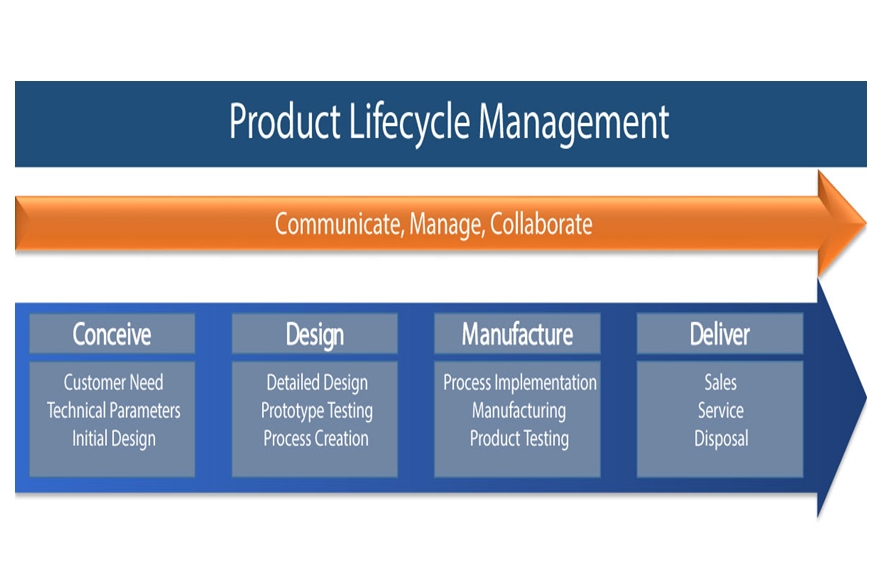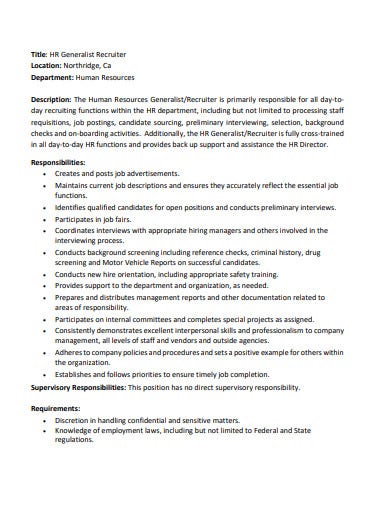
A generalist manages a range of HR tasks. This includes balancing the needs and wants of employees with those of the company. They must be current on all HR regulations. The role comes with its own challenges. This article will discuss the main aspects of this job and the requirements to be successful in this field. We'll also look at salary and education requirements, and offer a few career path ideas for those looking to enter the field.
Job description
The work day of an HR Generalist may differ from industry to industry. It will also depend on the time of year and the location. An average day starts with a cup o' coffee. After that, it is time to start your daily task list. You may need to coordinate changes in employee benefit programs, attend meetings, or write documents. You may also be responsible as an employee orientation specialist.
Another responsibility for a generalist is to manage performance appraisals. These are ongoing events where HR professionals sit down with managers to evaluate employees' performance. This is a shared responsibility between the HR department and the business. Many important decisions about an employee’s future will be made on the basis of these evaluations. Although specialists are available for larger companies, generalists in HR should have a good understanding of the business functions that manage performance appraisals.

Education requirements
The education requirements of a generalist position in HR may vary depending on company and industry. While a high school diploma is sometimes required, employers will also consider candidates who have relevant work experience. In addition to HR experience, candidates should be aware that many fields of study offer transferable skills. People with backgrounds in accounting, finance, marketing or law might find it useful to get an MBA or Master's in Human Resources.
The Human Resources Generalist is expected to be analytical and have a good understanding of key HR metrics. They may be required to train others on new systems. They should also be well-versed in the use of digital tools and technology. This includes both pre-assessment and recruitment technologies. Additionally, they should be proficient in online collaboration and communication platforms. This will enable them to be effective advisors to their clients. Furthermore, an HR Generalist must have the ability handle confidential information.
Salary
The average salary for a generalist working in human resources depends on the industry and where they work. They oversee the day to-day operations and management of human resources offices. They monitor employee evaluations and help to develop and implement HR policies. They also need to be multitaskers and be able to handle multiple projects simultaneously. They may also be responsible for recruiting, firing, or maintaining organizational activities. This makes them indispensable to small businesses as well.
Generalists in HR need to have a bachelor's degree or equivalent in human resources, and some experience. Many generalists have also completed internships that give them an understanding of the job as well as the duties. Generalist HR salaries vary depending on industry and job responsibility. People with a bachelor’s degree are paid less than those with more years of experience. Generally, HR generalists need at least two years of experience to be considered for a good salary.

Career path
As a generalist in human resource (HR), you can get more experience. As a generalist, you can pick from many responsibilities within the HR department. This position allows for more flexibility than specialist. A generalist can work across all areas of HR. If they are skilled in a specific area, they can move to a senior position like human resources director. You must be organized and able to multi-task to be an HR generalist.
A generalist position in HR might be for you. Generalists are required to be in close contact with employees and will be responsible for a wide range of tasks. Some organizations might need specialists to deal with certain issues and provide personalized attention to employees. While it's likely that you'll work in an office environment, a generalist position may also allow you to enjoy the jet set life. It's likely that you will spend much of your time traveling to campus and job fairs, looking for candidates.
FAQ
What are management concepts?
Management concepts are the practices and principles managers use to manage people or resources. They cover topics such as job descriptions and performance evaluations, human resource policies, training programs, employee motivation, compens systems, organizational structure, among others.
What is the difference between TQM and Six Sigma?
The major difference between the two tools for quality management is that six Sigma focuses on eliminating defect while total quality control (TQM), on improving processes and decreasing costs.
Six Sigma can be described as a strategy for continuous improvement. It emphasizes the elimination and improvement of defects using statistical methods, such as control charts, P-charts and Pareto analysis.
This method seeks to decrease variation in product output. This is accomplished by identifying the root cause of problems and fixing them.
Total Quality Management involves monitoring and measuring every aspect of the organization. Training employees is also part of total quality management.
It is often used to increase productivity.
It can sometimes seem difficult to make business decisions.
Complex systems are often complex and have many moving parts. Their leaders must manage multiple priorities, as well as dealing with uncertainty.
Understanding the impact of these factors on the system is crucial to making sound decisions.
You must first consider what each piece of the system does and why. Next, consider how each piece interacts with the others.
You need to ask yourself if your previous actions have led you to make unfounded assumptions. If they don't, you may want to reconsider them.
Asking for assistance from someone else is a good idea if you are still having trouble. They may see things differently from you and have insights that could help you find a solution.
What are the four major functions of Management?
Management is responsible for organizing, managing, directing and controlling people, resources, and other activities. Management also involves setting goals and developing policies.
Organizations can achieve their goals through management. This includes leadership, coordination, control and motivation.
Management's four main functions are:
Planning - Planning is about determining what must be done.
Organizing - Organization involves deciding what should be done.
Directing - This refers to getting people follow instructions.
Controlling – Controlling is the process of ensuring that tasks are completed according to plan.
Statistics
- This field is expected to grow about 7% by 2028, a bit faster than the national average for job growth. (wgu.edu)
- Our program is 100% engineered for your success. (online.uc.edu)
- Hire the top business lawyers and save up to 60% on legal fees (upcounsel.com)
- UpCounsel accepts only the top 5 percent of lawyers on its site. (upcounsel.com)
- Your choice in Step 5 may very likely be the same or similar to the alternative you placed at the top of your list at the end of Step 4. (umassd.edu)
External Links
How To
How do you implement a Quality Management Plan (QMP)?
Quality Management Plan (QMP), which was introduced in ISO 9001:2008, provides a systematic approach to improving processes, products, and services through continual improvement. It emphasizes on how to continuously measure, analyze, control, and improve processes, product/service, and customer satisfaction.
QMP is a common method to ensure business performance. QMP is a standard method that improves the production process, service delivery, customer relationship, and overall business performance. QMPs should cover all three dimensions - Products, Processes, and Services. The QMP that only addresses one aspect of the process is called a Process QMP. When the QMP focuses on a Product/Service, it is known as a "Product" QMP. QMP stands for Customer Relationships.
Two main elements are required for the implementation of a QMP. They are Scope and Strategy. They can be described as follows:
Scope is what the QMP covers and how long it will last. This will be used to define activities that are performed in the first six months of a QMP.
Strategy: This describes how you will achieve the goals in your scope.
A typical QMP consists of 5 phases: Planning, Design, Development, Implementation, and Maintenance. Here are the details for each phase.
Planning: In this stage, the objectives of the QMP are identified and prioritized. In order to fully understand and meet the needs of all stakeholders involved in this project, they are consulted. After identifying the objectives, priorities, and stakeholder involvement, the next step is to develop the strategy for achieving these objectives.
Design: The design stage involves the development of vision, mission strategies, tactics, and strategies that will allow for successful implementation. These strategies are put into action by developing detailed plans and procedures.
Development: Here, the development team works towards building the necessary capabilities and resources to support the implementation of the QMP successfully.
Implementation is the actual implementation of QMP according to the plans.
Maintenance: This is an ongoing process to maintain the QMP over time.
Additionally, the QMP should include additional items:
Stakeholder involvement is important for the QMP's success. They need to be actively involved in the planning, design, development, implementation, and maintenance stages of the QMP.
Initiation of a Project: A clear understanding and application of the problem statement is crucial for initiating a project. In other words, the initiator needs to know why they want to do something and what they expect from the outcome.
Time Frame: It is important to consider the QMP's time frame. For a short time, you can start with the simple version of the QMP. If you are looking for a longer-term commitment, however, you might need more complex versions.
Cost Estimation is another important aspect of the QMP. Planning is not possible without knowing the amount of money you will spend. The QMP should be cost-estimated before it can begin.
QMPs are more than just documents. They can also be updated as needed. It evolves as the company grows and changes. So, it should be reviewed periodically to make sure that it still meets the needs of the organization.